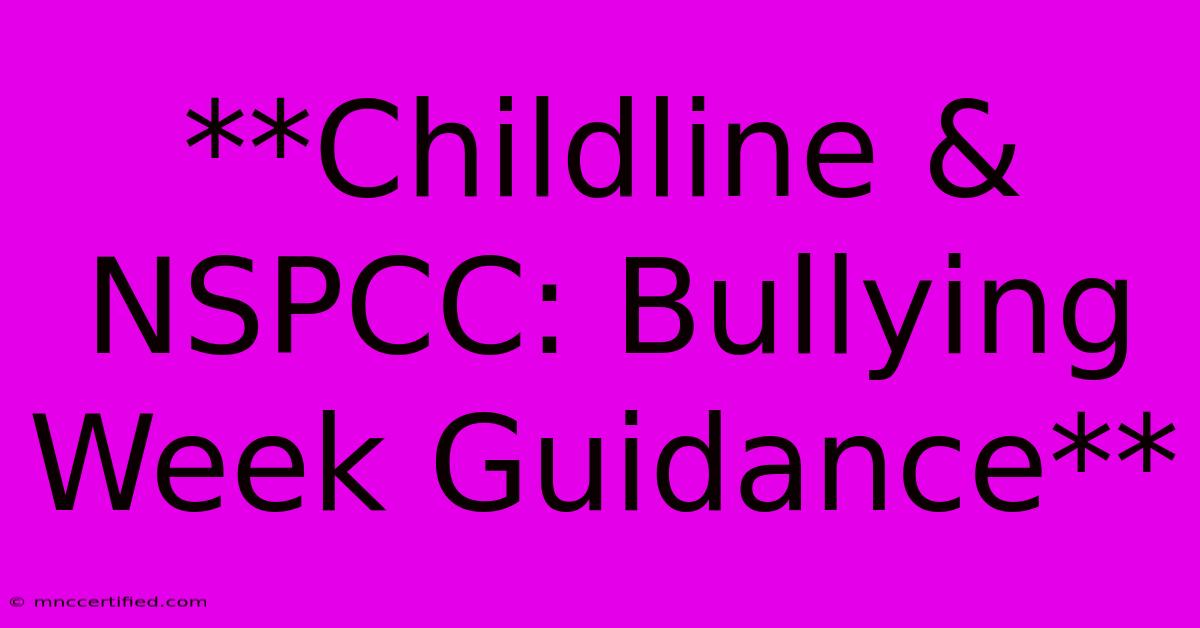**Childline & NSPCC: Bullying Week Guidance**

Table of Contents
Childline & NSPCC: Bullying Week Guidance
Bullying is a serious issue that affects children and young people across the UK. It can have a devastating impact on their mental health and well-being. To raise awareness and support young people experiencing bullying, the NSPCC and Childline have launched Anti-Bullying Week, an annual campaign dedicated to creating a safer and kinder environment for all.
Understanding Bullying
Bullying is any form of repeated, unwanted behaviour intended to hurt or intimidate someone. This can include:
- Physical bullying: Hitting, kicking, pushing, or damaging someone's property.
- Verbal bullying: Name-calling, insults, threats, or spreading rumors.
- Cyberbullying: Bullying online, through social media, text messages, or emails.
- Social bullying: Excluding someone from social groups, spreading rumors, or embarrassing them in public.
Supporting Children During Bullying Week
Anti-Bullying Week is a great opportunity to talk to children about bullying and how to prevent it. Here's how:
- Talk to them about bullying: Explain what bullying is and the different forms it can take. Encourage them to tell you if they are being bullied or if they see someone else being bullied.
- Emphasize the importance of kindness: Talk about the positive impact of being kind and respectful towards others.
- Promote understanding: Encourage children to put themselves in the shoes of someone being bullied and think about how it would make them feel.
- Encourage seeking help: Reassure children that they are not alone and there are people they can talk to, like teachers, parents, and Childline.
Childline's Role in Bullying Week
Childline plays a vital role during Anti-Bullying Week by providing a safe and confidential space for children to talk about their experiences with bullying. They offer:
- A free and confidential helpline: Children can call 0800 1111 or use the online chat service to speak to a trained counsellor about their concerns.
- Information and resources: Childline provides helpful information and resources on bullying, including tips for dealing with bullying, understanding its impact, and seeking support.
- Online safety advice: Childline also offers guidance on staying safe online and managing cyberbullying.
NSPCC's Anti-Bullying Campaign
The NSPCC actively participates in Anti-Bullying Week through various initiatives, including:
- Raising awareness: They work to educate children, parents, and teachers about the different forms of bullying and its consequences.
- Promoting prevention strategies: The NSPCC provides practical resources and guidance for parents and educators on how to prevent bullying in schools and communities.
- Supporting victims: They work to provide support and guidance to children who have experienced bullying and their families.
Key Takeaways
Anti-Bullying Week is a crucial reminder that bullying is a serious issue that requires our collective action.
- Talk to children about bullying.
- Promote kindness and respect.
- Encourage children to seek help if they need it.
- Support the work of organizations like Childline and the NSPCC.
Together, we can create a safer and kinder world for all children.

Thank you for visiting our website wich cover about **Childline & NSPCC: Bullying Week Guidance**. We hope the information provided has been useful to you. Feel free to contact us if you have any questions or need further assistance. See you next time and dont miss to bookmark.
Featured Posts
-
Skin Tag Removal Cost With Insurance
Nov 11, 2024
-
Rso Upsets Barcelona 1 0 In La Liga Highlights
Nov 11, 2024
-
Sam La Porta Latest Injury News Week 10
Nov 11, 2024
-
Title Loan With No Insurance Near Me
Nov 11, 2024
-
Gundogans Philosophy Believing And Doing Right
Nov 11, 2024